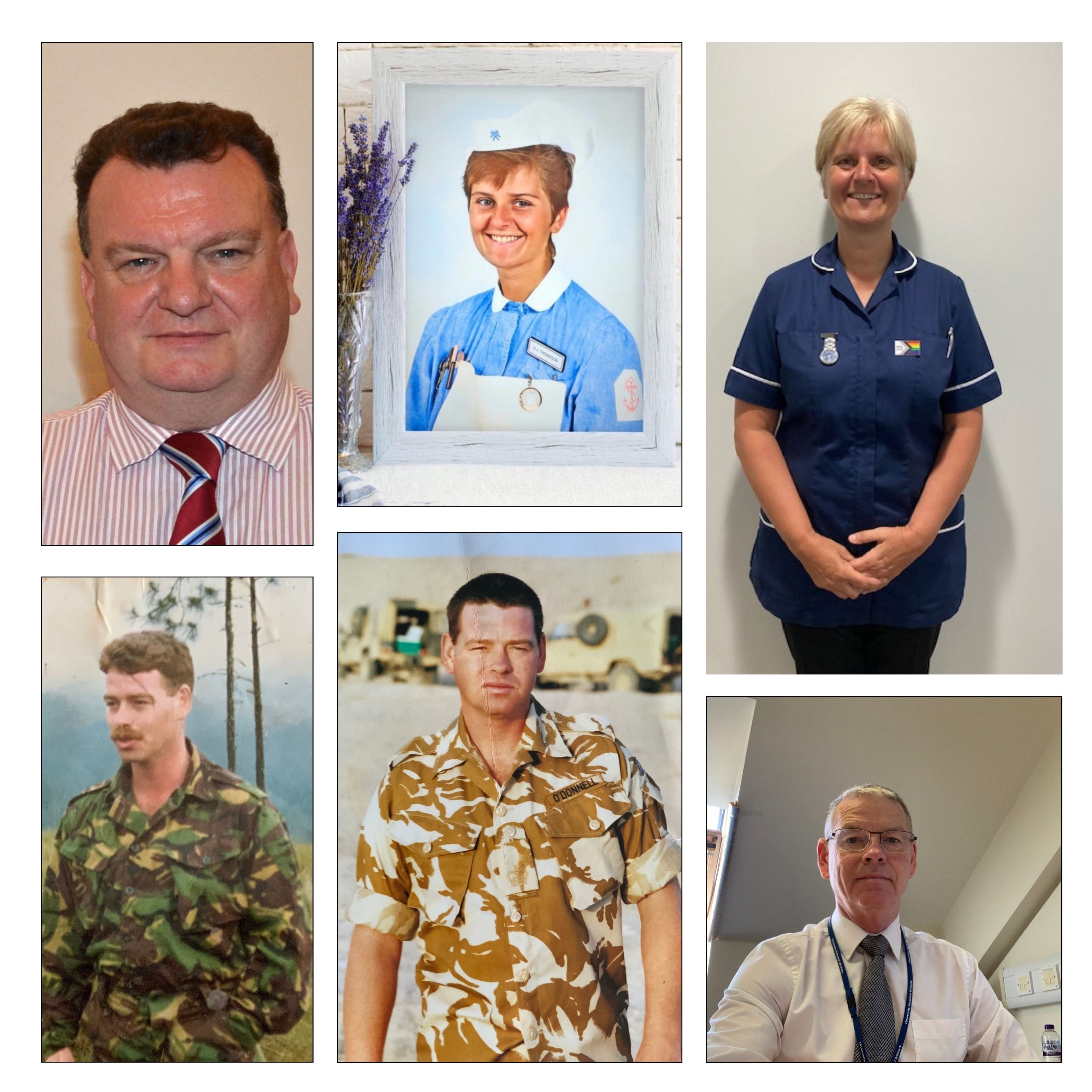Latest News
Extensive military experience that steels hospital boss
Published: Friday, 21 June 2024

In Armed Forces week we are profiling ex-military personnel who've joined our ranks.
NHS Lanarkshire’s Head of Hospital Services, Andrew O'Donnell (pictured in the bottom row) tells us how he’s moved from the ranks of the Army to a leading role in the delivery of healthcare. His current role is varied and involves responsibilities including policy implementation, resource allocation, and maintaining compliance with regulatory standards.
Tell us a bit about your military background and the roles you held during your service?
I joined the Army in 1985 after popping into an Army Careers Centre in Dumbarton to get out of the rain. Three weeks later, I was in Edinburgh starting my training. I first joined the Royal Highland Fusiliers (infantry) where I carried out several tours in Ireland, Iraq (Op Granby 1991), Kenya, and Belize, while stationed in Berlin, Edinburgh, and Cambridge. Following promotion to Corporal, I went on a posting to the Royal Electrical and Mechanical Engineers (REME) at their training establishment in Arborfield, Wokingham. I ended up transferring to the REME, where I stayed for the remainder of my 22 years of service. During this time, I returned to Iraq for a further three tours (Op Telic), was deployed to Bosnia, and moved around a bit between the UK, Germany, and Canada. I completed my time in Germany and left the forces as WO2 Company Sergeant Major.
What motivated you to transition from the armed forces to a career in the NHS?
As part of my service when I had reached the rank of Staff Sergeant, I spent some time as part of the Quartermaster’s Department as head of a team looking after the barracks facilities, such as buildings, equipment, uniform, and catering, as well as a few other areas. To me, this seemed a natural transition into Facilities Management, so as part of my resettlement, I completed the BIFM (British Institute of Facilities Management) course. I had various roles in the first year after leaving the forces, mostly short-term maternity cover (FM). I then applied for a Facilities Manager role within Durham and Darlington Primary Care Trust. This is where I first saw the impact the environment can make on patients, so I decided then that the NHS could be a second career.
How have the skills you developed in the military been useful in your current NHS role?
Leadership and management skills gained in the military have been the biggest advantage for me personally. Although some consider the military to be very autocratic, this is not always the case. You need to learn to work with people at all ranks, be able to work within each hierarchical structure, and still be able to influence and lead people.
Can you describe a situation in your NHS role where your military training made a significant difference?
Crisis management and command and control—the old saying about being able to keep your head while others around you are losing theirs. There have been a few occasions where a calm approach was needed, not only to calm others but to allow a solution to be worked up to resolve any issues.
What are some of the biggest challenges you faced when transitioning from the armed forces to the NHS, and how did you overcome them?
To be honest, I never found the transition from the military to the NHS that challenging; however, you need to get used to the change in pace. I am not saying that the NHS is slow, as it is not, but it does not have the structure of the forces, and things take a little longer to happen. It took me some time to get used to this. What I did to help overcome this was to make changes where I could. Next was the change in approach to get things done. You need to learn a different tactic, as shouting and pointing a stick (pace stick) at someone’s chest does not get things done; it gets you dismissed!
How does the sense of teamwork and camaraderie in the NHS compare to what you experienced in the armed forces?
Teamwork, as long as it is led correctly, will work in any environment and does in the NHS. Whether you are part of a team or leading a team, as long as you play your part, teams will gel quickly due to everyone having the same goals.
Go for it. The NHS is a great place to work and a place where you get a sense of achievement and job satisfaction when you see the difference you can make to people’s lives, even if only for a short time while in hospital. NHS terms and conditions of employment are good and give you the opportunity to strike a good work-life balance and put family first, as the military does not always give you that opportunity.




